Wednesday October 28, 2020 | VICTORIA, BC [Updated at 1:20 pm October 30, 2020]
by Mary P Brooke, B.Sc., editor | Island Social Trends
The total BC COVID case count is 13,875 which is up by 287 cases in the last 24 hours. Those new cases were found through 9,568 tests.
Of the total BC cases, 2,316 (-6) are active. And of those 83 (-1) are in hospital, with 25 (-2) in intensive care. Today there are three new cases on Vancouver Island (bringing the pandemic total to 253); most cases continue to occur in the lower mainland areas (Vancouver Coastal and Fraser Health regions).
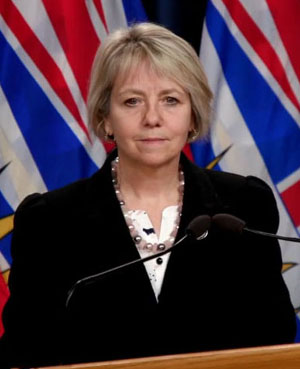
There have been two new deaths by COVID-19, bringing the BC total to 261.
These stats and notes are from the daily weekday release that comes from Provincial Health Officer Dr Bonnie Henry and Deputy Minister of Health Stephen Brown.
Adrian Dix will be part of the October 29 teleconference:
Tomorrow for the first time since the October 24 provincial election, Adrian Dix will join the teleconference as Health Minister (even though, technically-speaking, the new cabinet has yet to be sworn in).
Also participating at the October 29 COVID teleconference will be the president and CEO of Fraser Health, Dr Victoria Lee. Cities in the Fraser Health region are presently the hardest hit by COVID-19 infections.

Until there is a sworn-in new government, it was thought there would be no political contribution to the COVID scene in BC (the election was on October 24 but it will take up to three weeks for election results to be finalized by Elections BC due to the volume of mail-in ballots).
Limiting the number of people in our homes:
Yesterday Dr Henry issued an order limiting the number of people we can have in our homes. It’s for reasons of preventing or minimizing viral spread.
“The new order is about ensuring what happens in our homes is in step with what we are doing elsewhere,” said Dr Henry in her written statement today. This step is a formal order, but Dr Henry is stopping short of having it enforced with surveillance and fines.

If the COVID-19 pandemic wasn’t such as demonstrably serious and real viral threat, having the government tell us how many people we can have in our homes would be beyond Orwellian.
Just think of all the civic rights we have surrendered or bent to during the pandemic to date (including covering our faces which restricts personal interaction and social mobility), restricting ourselves to our homes for work and education, contorting our businesses to new hours and availability, and accepting strange distances from friends and loved ones.
“Just as we need to keep our groups to no more than six when we go to restaurants, we must also keep our groups small at home,” said Dr Henry.
Sticking to our ‘safe six’ is a catchy phrase. Not too far off from ‘safe sex’, which is an apt comparison… modern life without face mask and physical distancing is akin to sex without a condom or other protection.
Celebrating in small groups:
British Columbians have been reminded to keep personal interactions small and contained on Halloween, and to think about that same approach for Christmas (including a lamenting missive on that by Prime Minister Justin Trudeau on that yesterday).
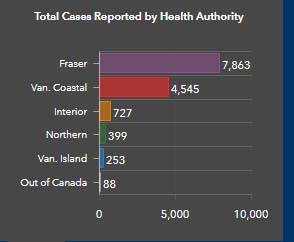
Yesterday Dr Henry said that the growth in case numbers over last weekend and the time period after Thanksgiving is “concerning, especially in the Vancouver Coastal and Fraser Health regions”.
Given home the SARS-CoV-2 (aka COVID-19) virus spreads through close proximity through the air, this change to limiting the number of people we share breathing space with is scientifically sensibly. But probably most British Columbians are still finding this ‘new reality’ quite a bit bizarre, something to adjust to.
“Let’s save the parties for when it is safe for everyone to celebrate,” Dr Henry continued today.
She says to keep weddings at home to six people and save the celebration for next year.
Birthday parties for kids are to be kept to the same group of a close social circle, not the entire class or sports team. “Talking, hugging, eating and drinking together indoors are much riskier than our normal school or work activities,” says Dr Henry.
Self-isolating – the number grows:
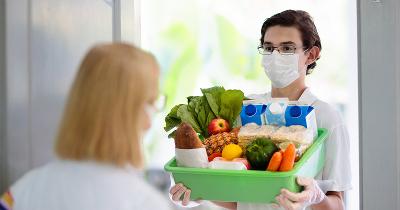
Presently 5,358 (+257) people are self-isolating due to known exposure to the virus, which is the highest tally yet.
That’s not as benign as it sounds. Daily lives are impacted, including adjustments to family arrangements in the home, employment availability or location, access to resources (and the cost to have things delivered), and range of social interactions and entertainment.
People who have contracted COVID-19 are also open to possible long-term health impacts that will affect anything from type of employment, range of physical activity, ongoing need for medications, and changes to insurance policies.
COVID-19 outbreaks:
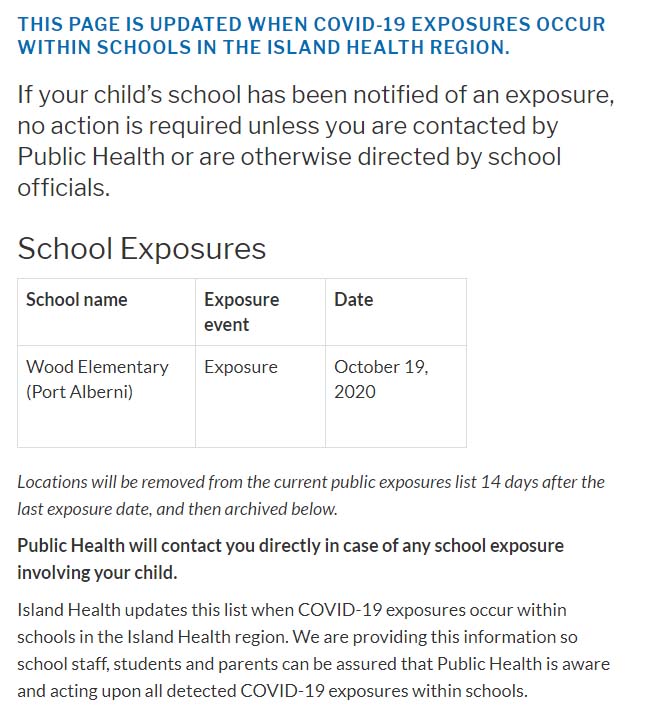
There has been one new health-care outbreak, at an assisted-living facility. In total, 21 long-term care or assisted-living facilities and one acute-care facility have active outbreaks.
There has been one new community outbreak at the Okanagan Men’s Centre.
Exposure events continue around the province. Public alerts and notifications are posted on the BC Centre for Disease Control website (including flights, schools, workplaces, cruises, long distance bus and train travel, and public events).
Alerts and notifications are also posted on all health authority websites. | Link to Island Health exposures page for schools (one current outbreak at Wood Elementary in Port Alberni which started October 19).
Last week two outbreaks in food processing plants were announced. The proximity of people (and perhaps limits to how well air can be circulated) seems to produce outbreaks in these types of facilities (including a few during this past summer).
Age distribution:
Of the 13,875 cases in BC at October 28, the increases are steady across all age groups.
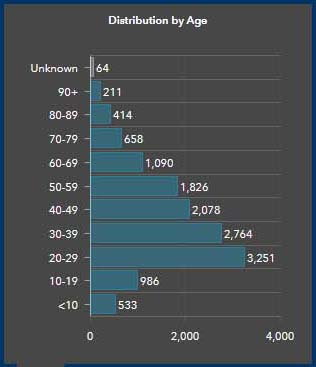
Among all persons under the age of 19 (children and teens combined), there have been 1,519 cases. That continues to be about 10.9% of total cases in BC in the pandemic this year.
In the October 28 COVID stats, another 14 children under the age of 10 tested positive, and 21 youth ages 10 to 19 tested positive.
Mainstream working-age adults (age 20 to 59) are seeing case-surges. In the last 24 hours those groups combined saw 161 new cases (30 more than yesterday’s case increase), comprised as follows.
- age 20 to 29: 3,251 (+30 in the last day)
- age 30 to 39: 2,764 (+50 in the last day)
- age 40 to 49: 2,078 (+51 in the last day)
- age 50 to 59: 1,826 (+30 in the last day)
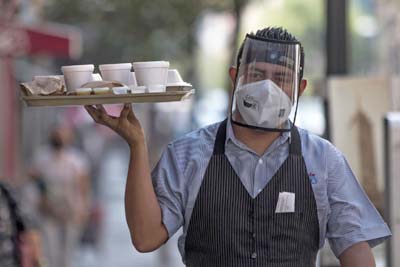
People in their 20s — with their whole adult lives ahead of them, possibly now compromised by lingering impacts of the COVID infection — comprise 3,251 of the cases (23.4%) so far this year. This not only impacts their own health and lives (and probably those of the people around them) but will have an impact on what work they can or cannot do now and in the future, which leads to economic impacts.
There appears to be a wide range of health impacts in people in the working-age groups… from dealing with the infection handily to those who have lingering symptoms for up to many months. Some impacts appear they will be permanent (such as lung tissue damage and cardiovascular impacts) which leads to long-term and perhaps chronic health issues.
Many adults in their 60s are still working (if not in the mainstream workplace, then from home). As they are generally included in the COVID ‘age’ risk factor, this group needs to be looked at distinctly. In total there have been 1,090 test-positive COVID cases in people ages 60 to 69 in BC (+20 since yesterday).
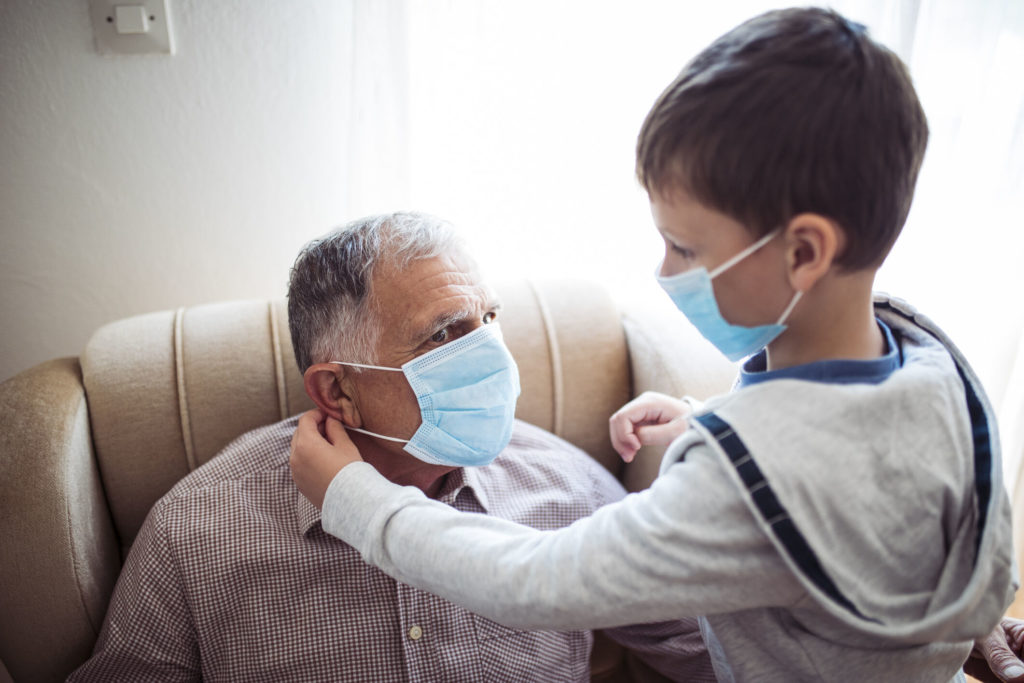
People in their 60s are in many cases parents and grandparents too, who can be affected by the spread of COVID from younger people in their lives and households. If people in this age group who were previously healthy come down with the COVID infection, this can add a burden on family. Or if there is no family, suddenly this catapults these relatively young seniors into a greater level of disability and disadvantage. The 60-to-69 age group comprises 7.86% of all cases so far this year.
The elderly (age 70+) are seeing strong case-count increases. Not all of these people are in long-term care; some if not many are still trying to maintain independent lifestyles.
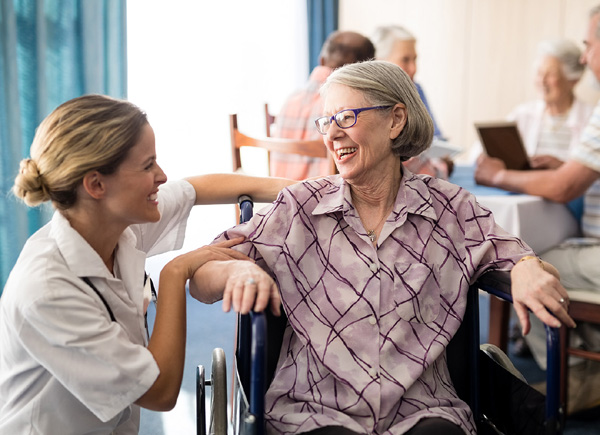
This grouping was at first the primary ‘vulnerable’ group referred to by public health as needing the most protection from the virus. Most of the COVID-related deaths do occur in people over age 70.
Across Canada (though mostly in Ontario and Quebec), 80% of deaths from COVID have occurred in long-term care, it was stated by Canada’s Chief Public Health Officer Dr Theresa Tam in Ottawa this week.
To date in the pandemic, there have been 1,283 test-positive cases of COVID-19 in the BC CDC age cohorts listed as 70-79, 80-89, and 90+. That includes 20 more cases in the last 24 hours. Breakdown:
- 70 to 79: 658 (+13 in the last day)
- 80 to 89: 414 (+6 in the last day)
- 90+: 211 (+1 in the last day)
Vancouver Island sees containment:
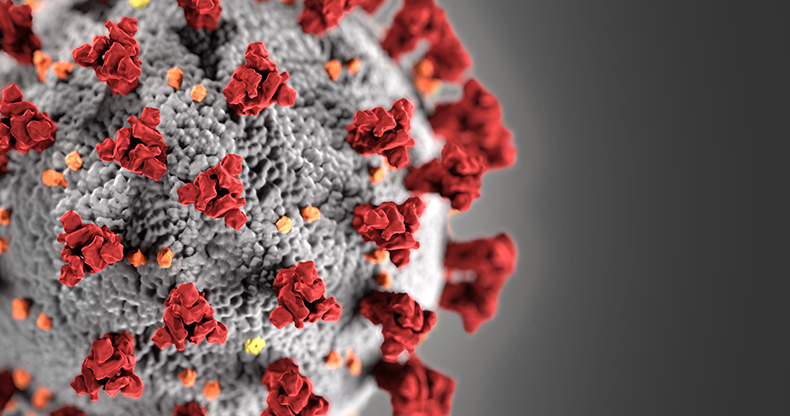
As for the continued awareness of Vancouver Islanders that case counts and transmission have been low here throughout the pandemic so far (253 cases all year to date, only 26 people hospitalized, and just six deaths).
Today’s three new cases show one person in their 20s, one in their 50s, and one in their 60s.
Three is a small number of cases given the provincial new-case count of 287 today, but Dr Henry is not letting her guard down on COVID in this region.
The COVID-19 virus uses human bodies as its hosts in which it will further replicate, and does not discriminate by geographical boundary or any other factor such as age, race, income or gender. It takes hold where it can.
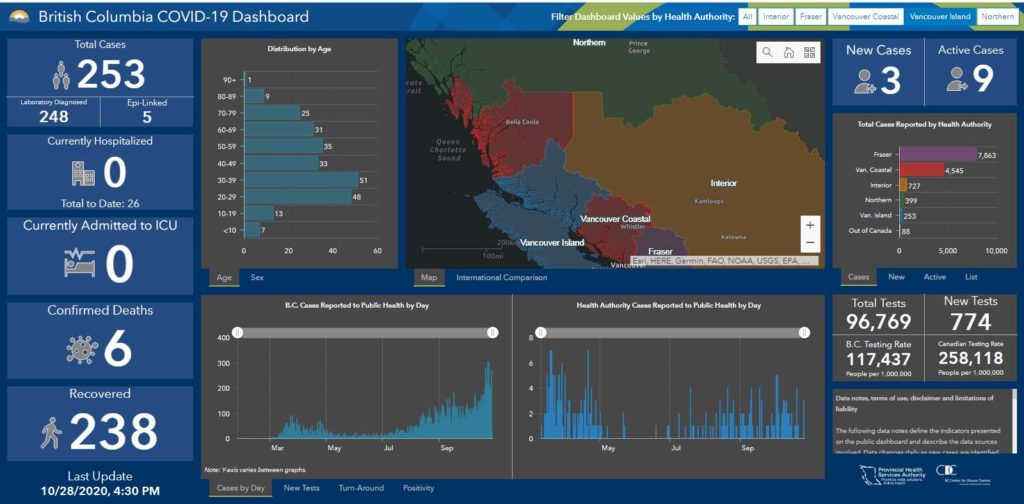
Dr Henry — who herself lives in the south Vancouver Island area, on Monday called the low number of cases on Vancouver Island “protective” but that it’s “not absolute”. Things can change quickly.
Her overall message to Vancouver Islanders is that no one should stop following the COVID-19 protocols which she calls very basic, including physical distancing, staying home if not well, wearing a face mask, and keeping social bubbles and gatherings small.
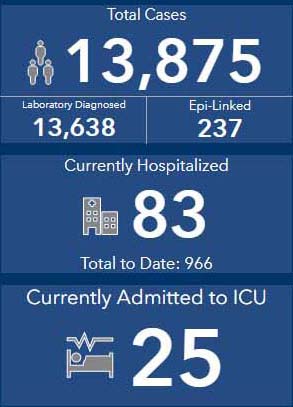
Islanders may in fact be benefiting by lower population density on the island but also by leaning to an overall more outdoor-lifestyle of just enjoying nature, more so than people may do in denser urban areas.
Hospitalization, testing and deaths:
In the pandemic in BC to date there have been 953 hospitalizations (26 of those on Vancouver Island). As of October 28 there are 83 people in hospital, with 26 of those in intensive care or acute care.
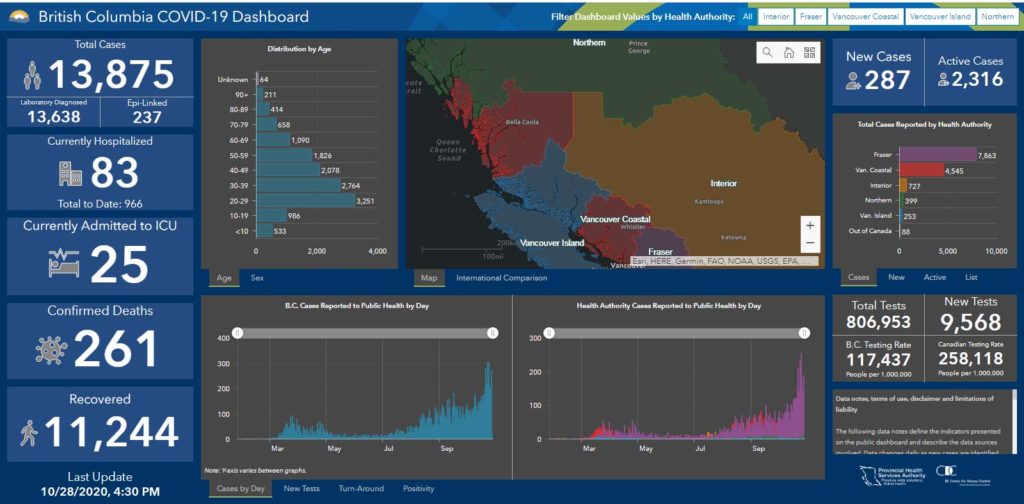
There have been 806,953 tests done in BC this year for COVID-19.
There have been 261 deaths to date.
COVID-19 across Canada (at October 28):
By all accounts the health and economic impacts of the COVID-19 pandemic are likely to get worse before they get better. Society has not been locked down to the same extent as in the first wave, so that the economy and important social connections can be somewhat facilitated.
We are in a second wave, and a third wave is already expected. Dovetailing of the flu season (October through March) adds complications to diagnosis and treatment of COVID-19, including availability of hospital space.
Due to COVID-19, in Canada there have been 10,032 deaths (+31 in the last day, on top of +28 tallied the day before that) since the start of the pandemic (261 of those in BC). The number of test-positive COVID-19 cases to date in Canada is 225,586 (+2699 since yesterday, which is on top of +2,674 the day before that). Active cases stand at 26,687 (+265 since yesterday, on top of +488 the day before). [Stats/map above to October 28, 2020]
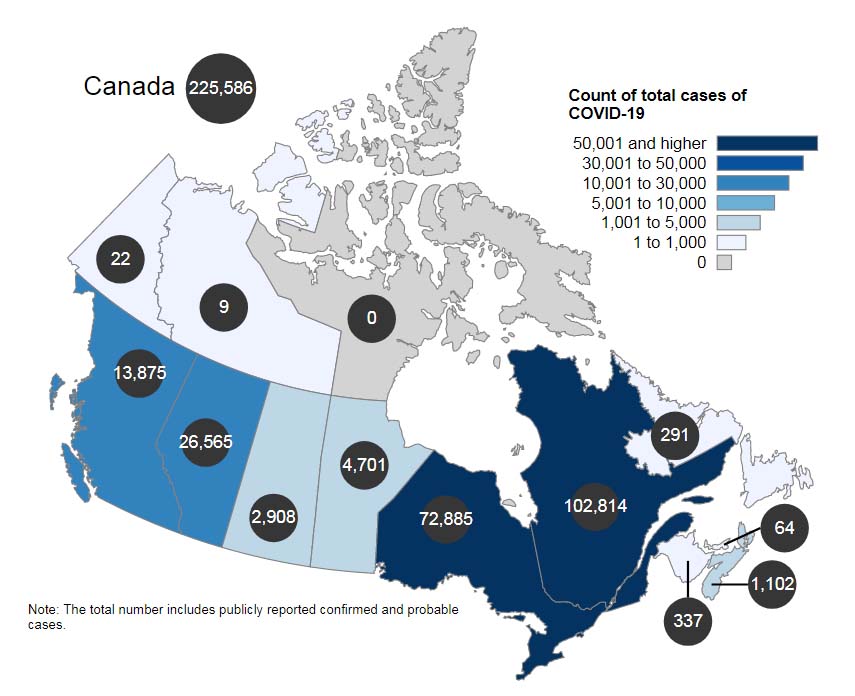

==== LINKS (local):
Langford reminds residents about COVID safety (October 17, 2020)
State of Emergency renewed now 17 times during pandemic (October 28, 2020)
===== LINKS (provided by BC Health):
BCCDC’s safer celebrations guidance: http://www.bccdc.ca/health-info/diseases-conditions/covid-19/social-interactions/safer-celebrations
To learn more about the Oct. 5 modelling presentation, visit:
https://news.gov.bc.ca/files/COVID19_Going_Forward_Oct_2020.pdf
Guidance for Halloween during COVID-19: http://www.bccdc.ca/health-info/diseases-conditions/covid-19/social-interactions/halloween
To find the provincial health officer’s orders, visit:
https://www2.gov.bc.ca/gov/content/health/about-bc-s-health-care-system/office-of-the-provincial-health-officer/current-health-topics/covid-19-novel-coronavirus
To see a map of COVID-19 cases by local health area, visit:
http://www.bccdc.ca/health-info/diseases-conditions/covid-19/data
If you are experiencing symptoms, find a collection centre near you to get tested: http://www.bccdc.ca/health-info/diseases-conditions/covid-19/testing
For mental health and anxiety support, visit: www.bouncebackbc.ca
Or: www.anxietycanada.com
For a listing of the community exposure events, visit:
BCCDC (flights, work sites, etc.): http://www.bccdc.ca/health-info/diseases-conditions/covid-19/public-exposures
Fraser Health: fraserhealth.ca/covid19exposure
Interior Health: https://news.interiorhealth.ca/news/public-exposures/
Island Health: https://www.islandhealth.ca/learn-about-health/covid-19/outbreaks-and-exposures
Northern Health: https://www.northernhealth.ca/health-topics/outbreaks-and-exposures
Vancouver Coastal: http://www.vch.ca/covid-19/public-exposures
For the latest medical updates, including case counts, prevention, risks and testing, visit: http://www.bccdc.ca/
Or follow @CDCofBC on Twitter.
For non-health related information, including financial, child care and education supports, travel, transportation and essential service information, visit: www.gov.bc.ca/covid19
Or call 1 888 COVID19 (1 888 268-4319) between 7:30 a.m. and 8 p.m. (Pacific time), seven days a week.
For the latest videos and livestreaming of COVID-19 media availabilities, visit:
Facebook: www.facebook.com/BCProvincialGovernment/
Twitter: https://twitter.com/BCGovNews
YouTube: www.youtube.com/ProvinceofBC


